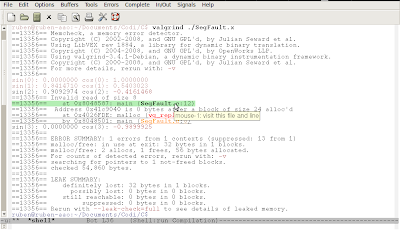
=9704= still reachable: 0 bytes in 0 blocks. =9704= possibly lost: 0 bytes in 0 blocks. =9704= definitely lost: 35 bytes in 2 blocks. =9704= 19 bytes in 1 blocks are definitely lost in loss record 2 of 2 =9704= 16 bytes in 1 blocks are definitely lost in loss record 1 of 2 =9704= searching for pointers to 2 not-freed blocks. =9704= For counts of detected errors, rerun with: -v =9704= malloc/free: 3 allocs, 1 frees, 47 bytes allocated. =9704= malloc/free: in use at exit: 35 bytes in 2 blocks. =9704= ERROR SUMMARY: 0 errors from 0 contexts (suppressed: 11 from 1) =9704= Copyright (C) 2000-2004, and GNU GPL'd, by Julian Seward et al. =9704= Using valgrind-2.2.0, a program supervision framework for x86-linux. =9704= Copyright (C) 2002-2004, and GNU GPL'd, by Julian Seward et al. This outputs a report to the terminal like =9704= Memcheck, a memory error detector for x86-linux. Overlapping src and dst pointers in memcpy() and related functions.Mismatched use of malloc/new/new vs free/delete/delete.Memory leaks - where pointers to malloc'd blocks are lost forever.Reading/writing inappropriate areas on the stack.

Reading/writing off the end of malloc'd blocks.Reading/writing memory after it has been free'd.Memcheck will issue messages about memory errors and leaks that it detects. 20 to 30 times) than normal, and use a lot more memory. The -leak-check option turns on the detailed memory leak detector. Valgrind -leak-check=yes myprog arg1 arg2


 0 kommentar(er)
0 kommentar(er)
